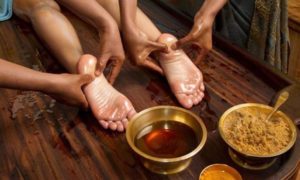 Ayurveda is an ancient Indian medical science which consists of two words, Ayu and Veda. Ayu means the life and Veda means science. Therefore Ayurveda is a science of life. Life according to Ayurveda is a combination of senses, mind, body and soul. So it is clear from this definition of life that Ayurveda is not only limited to the body or physical symptoms, but also gives a comprehensive knowledge about spiritual, mental and social health. Ayurveda’s aim is to maintain the health of a person and to cure the disease. Thus Ayurveda aims at having a happy, healthy and peaceful society.
Ayurveda is an ancient Indian medical science which consists of two words, Ayu and Veda. Ayu means the life and Veda means science. Therefore Ayurveda is a science of life. Life according to Ayurveda is a combination of senses, mind, body and soul. So it is clear from this definition of life that Ayurveda is not only limited to the body or physical symptoms, but also gives a comprehensive knowledge about spiritual, mental and social health. Ayurveda’s aim is to maintain the health of a person and to cure the disease. Thus Ayurveda aims at having a happy, healthy and peaceful society.
Dr. Mamtani couple of G Kumar Arogyadham believes that healthy soul remains in a healthy body alone. Today, when life style has necessitated speed, stress and strain, it is difficult to keep the body and mind healthy without any special efforts in that direction. Although the concept of soul is absurd, the Indians traditionally believe in its presence in the body and outside even after the death of a person. It is directly related by us to the peace of mind. Health, therefore, is a concept drawn from healthy thinking. Healthy or positive thinking can only come through a healthy body. Therefore, the old saying, ‘Health is Wealth’ holds true at any time.
The Indian traditional health sciences believe in healthy life, completely in consonance with nature. This has changed under the growing influence of western culture, initially; we exploited nature and the vast knowledge of the environment, plant and animal kingdom. Then we started following the materialistic approach of the western life style. The influence is so vast that selfish approach has led to rampant exploitation of natural resources, earning money without caring for anything including our own health. Here health means physical and mental well-being.
Now, when the ill-effects of this approach are being experienced, people have started realizing the importance of traditional health science i. e. Ayurveda. The entire world is facing severe health problems, mainly because of the changed life style. In an effort to get fast relief, we accepted modern medicine. Now the side-effect of the in judicious use of modern medicine is seen to have crippled human life in many ways. Increasing number of health problems like hypertension, diabetes, heart disease, stress-related problems of the brain including paralysis, asthma etc.
They say – “Ayurveda, which is based more on healthy living instead of offering symptomatic treatment to the ailing person, is now considered a ray of hope again. This phenomenal change in the approach is not restricted to the boundaries of India, but is also accepted and adopted globally. The realization came from the fact that one cannot enjoy the wealth he has earned without being healthy. Here again Ayurveda and related ancient Indian health sciences believe in ‘Prevention is better than cure’. It includes Yoga, which is considered a part of Ayurvedic Science. Health throughout the world has become a major issue. It has been projected that majority of the world population will be affected by problems like diabetes, hypertension, asthma, HIV/AIDS in the next few decades. Our mother Earth will be full of crippled people soon. This has to be realized and serious efforts are to be taken on war footing.” Hence it is clear that Ayurveda shows the path of healthy living. One has to strictly follow some restraints and follow guided life style.
 When one believes in the four basic goals of life as ‘Dharma, Artha, Kama, and Moksha’, one should have good health for achieving them. Thus health is wealth in its true sense. Ayurveda is considered to be the upa-veda of Atharvaveda and it is also believed that it was carefully written by Lord Brahma himself through his incarnation ‘Dhanwantari’.
When one believes in the four basic goals of life as ‘Dharma, Artha, Kama, and Moksha’, one should have good health for achieving them. Thus health is wealth in its true sense. Ayurveda is considered to be the upa-veda of Atharvaveda and it is also believed that it was carefully written by Lord Brahma himself through his incarnation ‘Dhanwantari’.
In Ayurveda, it has been stated ‘Swasthasya swasthya rakshanam, aaturyasya vikar prashamanamcha’ meaning health sciences work for the protection of the health of a person and warding off disease from the afflicted patient/person. The detailed information about life style to be followed in different seasons – during day and night, restrictions on eating and sex etc. during a particular period or situation, has been given in ancient books of Ayurveda. Detailed description on procedures to be followed right from the stage of conception to death finds place in the Charak Samhita and Sushrut Samhita, the most recognized books in Ayurveda. Charak and Sushrut are known to be experts in pharmacology and surgery respectively.
Even today, traditional medicines are more acceptable during pre-natal and post-natal care. ‘Chyavanprash’, which has gained global popularity because of its commercial projection, is a medicine prepared by Chyavan Rishi, for his own health and longevity. This is a part of the ‘Rasayan Chikitsa’ in Ayurveda. The traditional Indian food habits and recipes contain ingredients originating from Ayurveda have medicinal value.
Ayurveda believes in correcting the root-cause of the disease and improving the immune system. For example, a modern medicine practitioner would reduce blood sugar by administering insulin to a diabetic. Diabetes is caused because of malfunctioning of the insulin secreting gland called pancreas. With continuous supply of insulin from outside pancreas completely stops functioning. The patient thus becomes external insulin-dependent for the rest of his life. The side-effects of consuming insulin include weakening and even loss of eyesight, reduced immunity, failure of vital organs like kidneys and heart .
An Ayurvedic practitioner treats the pancreas and ensures that it starts functioning normally. The patient is thus able to lead a normal life. In Ayurveda, medicines are given to strengthen heart muscles, so that it can combat the diseases on its own. Similar is the treatment related to a large number of ailments arising out of malfunctioning of the liver like indigestion, jaundice, cirrhosis etc.
In problems like insomnia or stress related problems and many other psychological problems, medicines which would make the patient sleep are administered. Is this a justice to the patient to provide just a temporary relief? In fact, it adversely affects the functioning of the brain. In Ayurveda, Medhya medicines to improve the functioning of the brain are prescribed. Besides medicines, certain procedures are carried out to ensure overall health of the person.
 Arthritis is another major problem faced by the people. It has become common due to lack of exercise, changing food habits, sedentary life style etc. In modern health science, only pain relieving drugs are given. The steroids used further cripple movement of the joints and also affect the other vital organs of the body. Ayurveda prescribes procedures like ‘Panchkarma’ to overcome this problem. This has a major significance as the procedures adopted are for the purification of the body. All kinds of toxins from the body are removed through Panchkarma.
Arthritis is another major problem faced by the people. It has become common due to lack of exercise, changing food habits, sedentary life style etc. In modern health science, only pain relieving drugs are given. The steroids used further cripple movement of the joints and also affect the other vital organs of the body. Ayurveda prescribes procedures like ‘Panchkarma’ to overcome this problem. This has a major significance as the procedures adopted are for the purification of the body. All kinds of toxins from the body are removed through Panchkarma.
Thus Ayurveda makes the body healthy by improving the immune system. The side-effects experienced in modern medicines are also avoided. The added advantage is that the medicines used are selected from nature and artificial chemical treatment is avoided. The ancient experts in this field have very minutely studied the flow of body fluids, behaviour of all the systems in the human body and also in plants. The medicines are selected only after studying the behaviour of the body of the patient individually.
Ayurveda thus is looked upon as a science, which can help human beings lead a healthy and better life. The realization has come only when sufferings due to changed life style is crippling life. This has adversely affected the real enjoyment of life, despite capability of buying every luxury in the world. “Ayurveda is thus an art of living a healthy life.”



